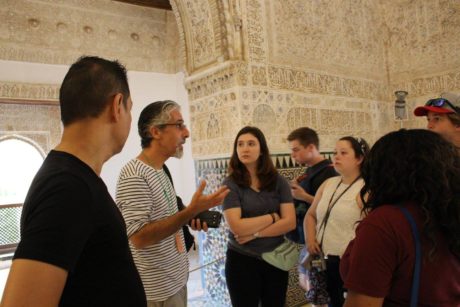Hola, clase. Today, I’m writing about intercultural learning capacities, or, in plainer terms, culture shock.
During our week-long traveling seminar, the Trinity in Spain program was accompanied by Katsuo Nishikawa, a political science professor who is also the director for the Center of International Engagement. Nishikawa conducted three classes covering some common misconceptions about the idea of “˜culture’ and what we might face while abroad.
First, Nishikawa tried to wrap our heads around the idea of culture as a social construct of our respective realities. Usually, our idea of culture is the small stuff. British driving on the wrong side of the road, southerners saying “y’all” instead of “you guys,” Spaniards eating dinner at the ungodly hour of 9 p.m. These ideas, while cultural, are only small parts of the culture as a whole.
Our brains tell us that the way we experience the world is the right way, the only way, it can be experienced. We create models of our world “” our realities “” and continuously run simulations of that model into the future. That explains why suddenly jumping into a new culture is a shock, as well as why cultural adaptability is so valued, and often difficult to learn.
Nishikawa taught us that there are four human capacities that need to be learned in order to better our intercultural development: our capacity to know our own mind, to understand and sense the thoughts and emotions of others, to access and override part of our unconscious processing and to become more effective and appropriate in interacting with others.
He gave us a quick and dirty method to start thinking about cultural differences. To fully accept and understand a culture, you must shift your own mindset, your reality, and learn theirs. When you see something different in a new culture, ask yourself, “What assumption am I making, that I’m not aware I’m making, that gives me what I see?” This way, you can learn and appreciate this new culture without simply noticing the differences between yours and theirs.
One method that the Trinity in Spain program began employing from early on is using history as a tool to shift students’ mindsets. Understanding the culture of Spain today can only be achieved by also understanding Spain’s complex and intense history. Why does Spain specialize in cooking pork dishes? Our guide Angel Gonzalez, a professor from IES Madrid, explained to us that one reason could be in response to Spain’s time under Muslim rule. When the Christian Reconquest finally ended, they might’ve seen pork as a way to divide themselves from the Muslim religion and practices. But they also saw the drastic advancements made by the intellectuals of the time, and honored them by keeping their mosques and other influences. When visiting the nation’s mosques and cathedrals, we saw the extreme difference between the two artistic and religious styles, yet they all came together to form Spain. This history is integral to Spain’s culture, and understanding that can bring you one step closer to understanding a different reality.

Having said all of this, and realizing that pointing out my culture shock is counterintuitive to what I’ve learned, I’m going to point out an example of culture shock I’ve noticed between Spain and the United States, because it’s particularly funny.
The fact that Spain doesn’t refrigerate eggs is still shocking to me. I did research, though, and now I’m not worried about getting food poisoning. According to Rae Ellen Bichell in her article “Why The U.S. Chills Its Eggs and Most of the World Doesn’t“ on NPR, the world simply goes about ensuring safe eggs by using different methods. The reason why eggs are so testy is because of the risk of salmonella, which the chicken contracts before the eggs are even laid. Cooking the egg is the best way to burn the salmonella out, but bacteria can still infiltrate the egg in hairline fractures or breaks. In the 1970s, the United States and Japan began regulating the washing of eggs. Washing eggs, however, washes off the egg’s natural coat. The natural coat does the same job of preventing bacteria and protecting the egg. Instead of washing off this natural coat, Europe and other countries developed a vaccine that is given to chickens that prevents salmonella.
Fun, right? Some other cool cultural shocks: Dunkin’ Donuts in Spain is Dunkin’ Coffee, nightlife doesn’t start until 2 a.m. and doesn’t end until 8 a.m. and Europeans only use the 24-hour clock (instead of our 12-hour clock) to make American students feel inadequate for not being able to do mental math.






